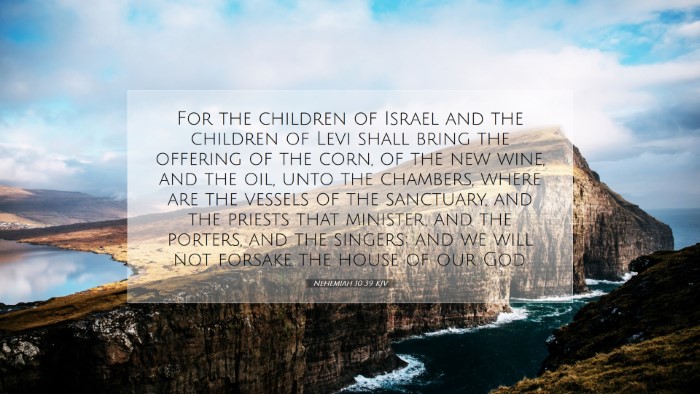Commentary on Nehemiah 10:39
Verse: "For the children of Israel and the children of Levi shall bring the offering of the corn, of the new wine, and the oil, unto the chambers, where are the vessels of the sanctuary, and the priests that minister, and the porters, and the singers: and we will not forsake the house of our God."
Introduction
Nehemiah 10:39 encapsulates a vital moment in the restoration of the Jewish community after the Babylonian exile. The commitment to not forsake the house of God highlights the importance of worship and support for the Levitical priesthood. This commentary draws upon the insights of public domain scholars to shed light on the theological and practical implications of this verse.
The Importance of Offerings
Matthew Henry's Perspective: Matthew Henry emphasizes that offerings are not merely a duty but a delight of the faithful. He notes that the children of Israel recognized the necessity of providing for the ministry and worship within the temple. Generosity towards the temple signifies a heartfelt connection to God and His service.
Albert Barnes' Insight: Barnes further clarifies that the offerings mentioned—corn, new wine, and oil—represent the fruits of the earth, which were essential in ancient Israelite culture. His commentary highlights that such contributions reflect an acknowledgment of God’s provision and sustenance. By bringing these offerings, the Israelites expressed their gratitude and dependence on God's ongoing blessings.
The Role of the Levites and Priests
Adam Clarke's Explanation: Clarke provides an in-depth look at the roles of the Levites and priests mentioned in the verse. The Levites, as aids to the priests, were instrumental in temple practices, ensuring that worship was conducted properly. Clarke points out that the support of these leaders was paramount since it allowed them to focus on spiritual duties without the distraction of providing for their physical needs.
- Porters: Responsible for guarding the temple and ensuring order.
- Singers: Leading worship through music, an essential part of temple life.
Commitment to God's House
Reflection on Community Commitment: The declaration of commitment to not forsake the house of God signifies a communal responsibility. It reflects a collective acknowledgment that spiritual health relies on active participation in worship, maintenance of the temple, and care for the ministers. The verse serves as a call for church communities today to prioritize their spiritual homes and leaders.
Theological Implications
Spiritual Significance: Henry observes that the affirmation to support God’s house is also a reflection of a deeper spiritual truth; it symbolizes fellowship with God and a commitment to His covenant. To neglect the temple would mean neglecting the relationship between God and His people, which is fundamental to communal identity.
The Covenant Context: This verse occurs within the broader framework of the covenant renewal initiated by Nehemiah and Ezra. It highlights the Israelites’ resolve to be faithful to the covenant stipulations, which included proper worship and support of the Levitical priesthood. As Barnes notes, this renewal was a response to past neglect and a promise to restore what had been forsaken.
Conclusion
The commitments outlined in Nehemiah 10:39 serve as a reminder of the fundamental duty every believer has toward supporting the church and its leaders. As discussed, the offerings of material goods represent a recognition of God's providence and a willingness to contribute to the sacred work of ministry. Pastors, students, theologians, and scholars alike can draw from this text a renewed sense of purpose in supporting their local congregations and understanding the ramifications of their worship practices.


